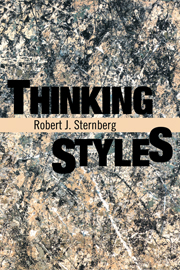Book contents
- Frontmatter
- Contents
- Preface
- Part I The Nature of Thinking Styles
- Part II The Principles and Development of Thinking Styles
- Part III Thinking Styles in School and in Research and Theory
- 7 Thinking Styles in the Classroom: What Have We Learned?
- 8 A Capsule History of Theory and Research on Styles
- 9 Why a Theory of Mental Self-government?
- Notes
- Index
8 - A Capsule History of Theory and Research on Styles
Published online by Cambridge University Press: 05 August 2012
- Frontmatter
- Contents
- Preface
- Part I The Nature of Thinking Styles
- Part II The Principles and Development of Thinking Styles
- Part III Thinking Styles in School and in Research and Theory
- 7 Thinking Styles in the Classroom: What Have We Learned?
- 8 A Capsule History of Theory and Research on Styles
- 9 Why a Theory of Mental Self-government?
- Notes
- Index
Summary
Most mathematicians would make lousy accountants. But why? Do they lack mathematical ability? Obviously not. For the most part, they are at or near the top of the scale on any test of mathematical ability that anyone can come up with. Moreover, they were able to become mathematicians only by virtue of high levels of achievement in mathematics, so that they are not people whose abilities simply go unrealized. Rather, they seem to differ stylistically from accountants in major ways. The kinds of problems they like to work on are completely different. For example, few mathematicians would want to learn tax codes; but few accountants would want to spend their time doing mathematical proofs. Accountants and mathematicians may or may not have the abilities to do each other's jobs; what is clear is that stylistically, the requirements of the jobs are worlds apart.
Interest in the notion of styles developed in part as a response to the recognition that conventional ability tests provide only part of the answer to why people differ in their performance, whether that kind of performance is in mathematics or something else. If abilities are only part of the answer to understanding how and why people differ in their performance, what might the rest of the answer be?
One possibility, of course, would be personality. Someone with personal difficulties might well be at risk for various kinds of performances, in school or on the job.
- Type
- Chapter
- Information
- Thinking Styles , pp. 133 - 147Publisher: Cambridge University PressPrint publication year: 1997
- 1
- Cited by



